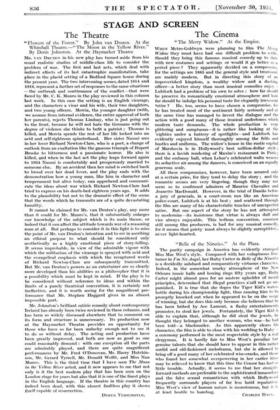• STAGE AND SCREEN
The Theatre "Flowers of the Forest." By John van Druten. At the Whitehall Theatre.—" The Moon in the Yellow River." By Denis Johnston. At the Haymarket Theatre Mn. VAN DRUTEN in his new play has turned aside from his usual realistic' studies of middle-class life to consider the problem of war. The first and last acts, which deal with indirect effects of its last catastrophic manifestation, take place in the placid setting of a Bedford Square house during the present year. The two intervening scenes, dated 1914 and
1916, represent a further set of responses to the same situations —the outbreak and continuance of the conflict—that were faced by Mr. C. K. Munro in the play reviewed in this column last week. In this case the setting is an English vicarage, and the characters a vicar and his wife, their two daughters, and two young officers. Mercia, the younger daughter (with, we assume from internal evidence, the entire approval of both her parents), rejects Thomas Lindsay, who is just going out to the front, because he will not hate the Germans with the degree of violence she thinks to befit a patriot ; Thomas is killed, and Mercia spends the rest of her life locked into an acid and self-righteous spinsterhood. Her sister Naomi sees in her lover Richard Newton-Clare, who is a poet, a change of outlook from an exaltation like the gaseous triumph of Rupert Brooke to bitterness and a passionate horror. He also is killed, and when in the last act the play leaps forward again to 1934 Naomi is comfortably and prosperously married to someone else. By an accident then her mind is switched back to brood over her dead lover, and the play ends with the demonstration how a young man, like him in character and temperament but alive today, can apprehend and communi- cate the ideas about war which Richard Newton-Clare had tried to express on his death-bed eighteen years ago. It adds to the plausibility but not to the dramatic effect of the scene that the words which he transmits are of a quite devastating banality.
It cannot be claimed for Mr. van Druten's play, any more than it could for Mr. Munro's, that it substantially enlarges our knowledge of the subject which is its main theme, or indeed that it can affect the attitude towards war of a reasoning man at all. But perhaps to consider it in this light is to miss the point of Mr. van Druten's intention and to err in ascribing an ethical purpose to what should be considered only aesthetically as a highly emotional piece of story-telling. It seems improbable, in view of the admirable vigour with which the militarism of the vicarage is sprayed with acid and the evangelical emphasis with which the recaptured words of Richard Newton-Clare are subsequently transmitted. But Mr. van Druten's powers as an entertainer are so clearly more developed than his abilities as a philosopher that it is a possibility which must be kept in mind. If the play is to be considered without reference to ideas and within the limits of a purely theatrical convention, it is certainly not ineffective, and it is worth seeing for the magnificent per- formance that Mr. Stephen Haggard gives in an almost impossible part.
Mr. Johnston's brilliant satiric comedy about contemporary Ireland has already been twice reviewed in these columns, and has been so widely discussed elsewhere that to comment on its form and structure is unnecessary. Its production now at the Haymarket Theatre provides an opportunity for those who have so far been unlucky enough not to see it to do so without delay. The acting and production have been greatly improved, and both are now as good as one could reasonably demand : with one exception all the parts are admirably played, and there are quite magnificent performances by Mr. Fred O'Donovan, Mr. Harry Hutchin- son, Mr. Gerard Tyrrell, Mr. Donald Wolfit, and Miss Nan Munro. This is the third time that I have seen The Moon in the Yellow River acted, and it now appears to me that not only is it the best modern play that has been seen on the London stage for years but also that it is one of the finest plays in the English language. If the theatre in this country has indeed been dead, with this almost faultless play it shows itself capable of resurrection.
DEREK VERSCIIOYLE.










































 Previous page
Previous page